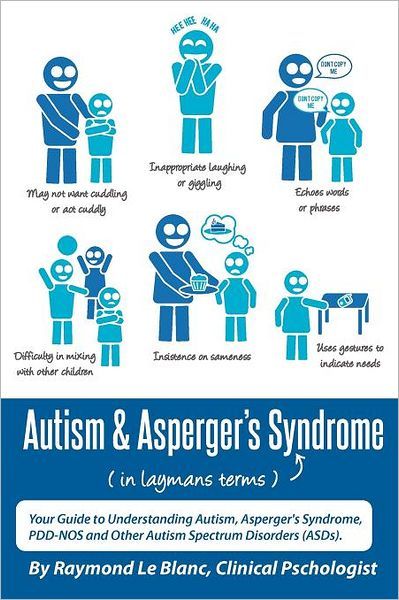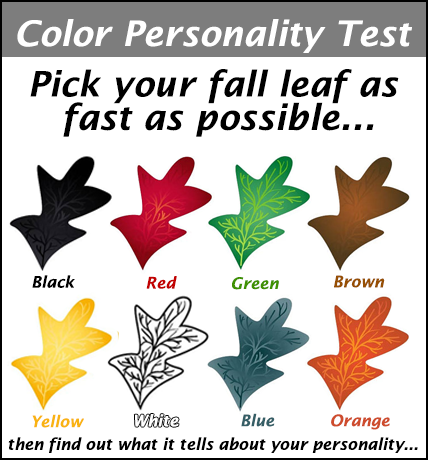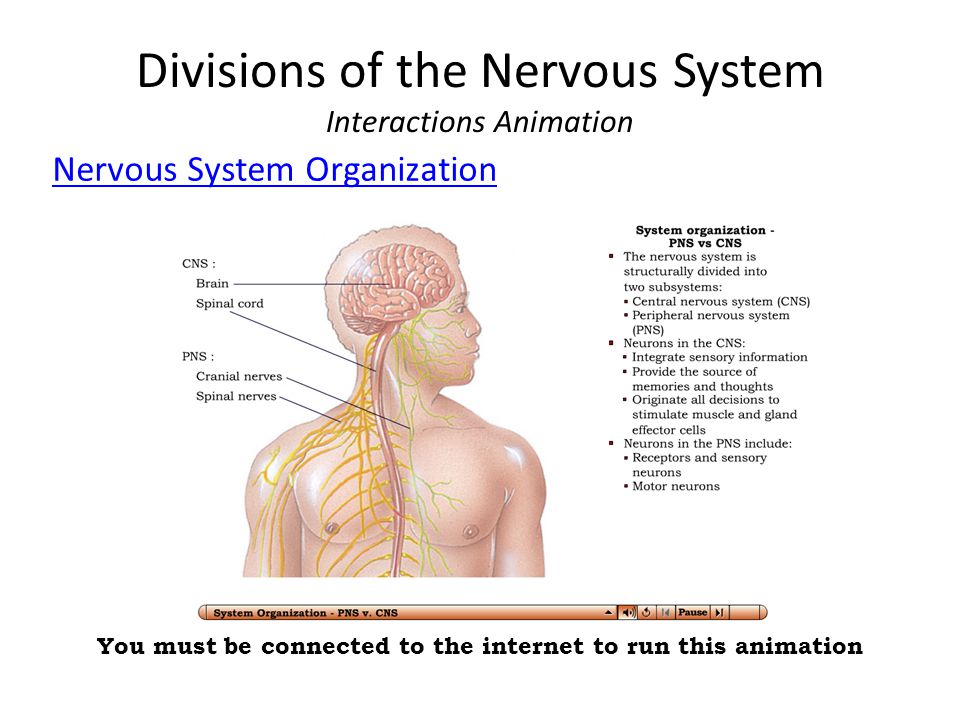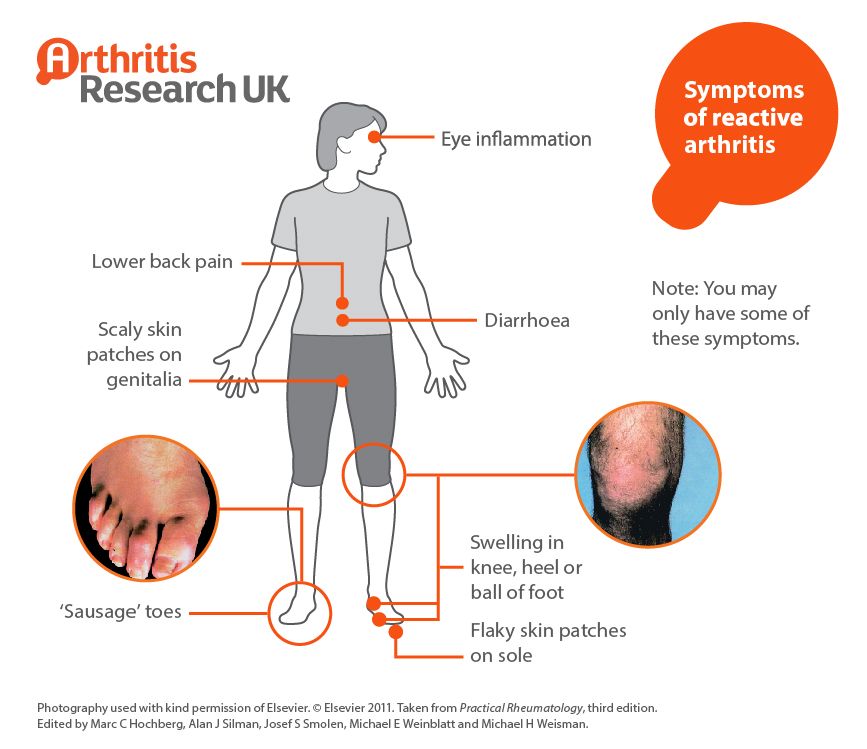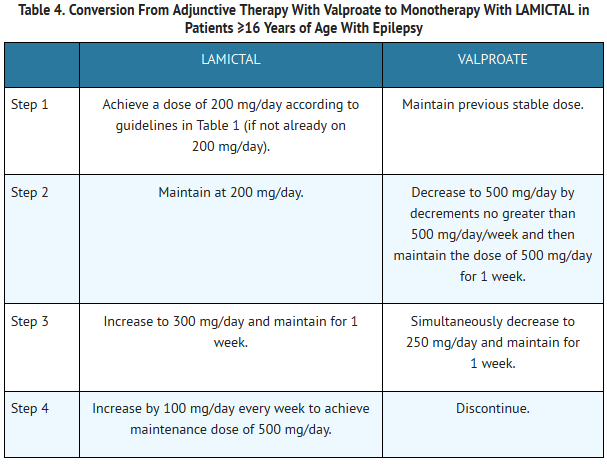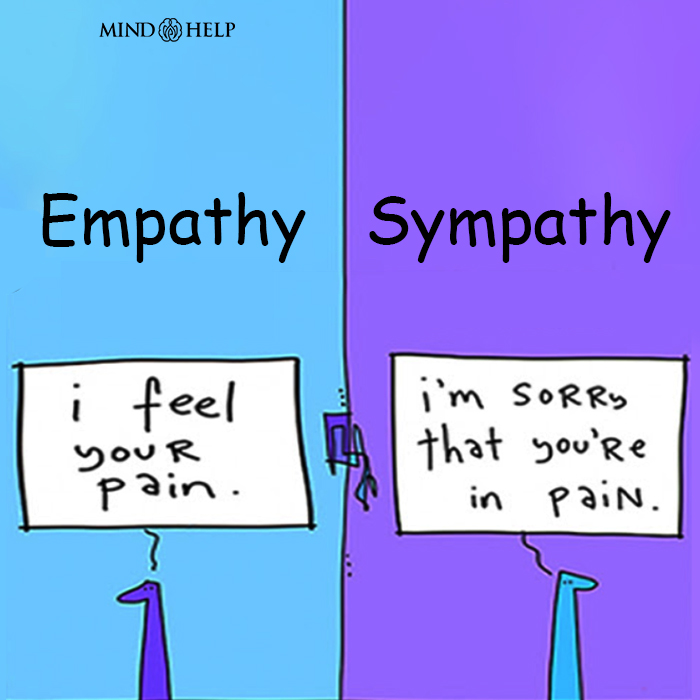Asperger signs in children
Asperger's Syndrome: Symptoms, Diagnosis and Treatment
Nationwide Children’s Hospital
Overview
Signs & Symptoms
Causes
Diagnosis
Treatment
Seeking Help
What is Asperger’s Syndrome?
Asperger’s Syndrome is a developmental disorder. Young people with Asperger’s Syndrome have a difficult time relating to others socially and their behavior and thinking patterns can be rigid and repetitive.
Generally, children and teens with Asperger’s Syndrome can speak with others and can perform fairly well in their school work. However, they have trouble understanding social situations and subtle forms of communication like body language, humor and sarcasm.
They might also think and talk a lot about one topic or interest or only want to do a small range of activities. These interests can become obsessive and interfere with everyday life, rather than giving the child a healthy social or recreational outlet.
Boys are three to four times more likely than girls to have Asperger’s Syndrome. Most cases are diagnosed between the ages of five and nine, with some diagnosed as early as age three.
What Is the Difference Between Asperger’s Syndrome and Autism Spectrum Disorder?
The name for Asperger’s Syndrome has officially changed, but many still use the term Asperger’s Syndrome when talking about their condition. The symptoms of Asperger’s Syndrome are now included in a condition called Autism Spectrum Disorder (ASD). ASD is now the name used for a wide range of autism-like disorders. Some providers may still use the term Asperger’s Syndrome, but others will say “ASD – without intellectual or language impairment.” These two syndromes are, for the most part, the same.
What are the Symptoms of Asperger’s Syndrome?
Children with Asperger’s Syndrome exhibit poor social interactions, obsessions, odd speech patterns, limited facial expressions and other peculiar mannerisms. They might engage in obsessive routines and show an unusual sensitivity to sensory stimuli.
While all children with Asperger’s Syndrome are different, what sets them apart are their unusual social skills and obsessive interests. For a child with Asperger’s Syndrome, you may see one or more of the following symptoms:
- Inappropriate or minimal social interactions
- Conversations that almost always revolve around themselves or a certain topic, rather than others
- Not understanding emotions well or having less facial expression than others
- Speech that sounds unusual, such as flat, high-pitched, quiet, loud, or robotic
- Not using or understanding nonverbal communication, such as gestures, body language and facial expression
- An intense obsession with one or two specific, narrow subjects
- Becoming upset at any small changes in routines
- Memorizing preferred information and facts easily
- Clumsy, uncoordinated movements, including difficulty with handwriting
- Difficulty managing emotions, sometimes leading to verbal or behavioral outbursts, self-injurious behaviors or tantrums
- Not understanding other peoples’ feelings or perspectives
- Hypersensitivity to lights, sounds and textures
Children with Asperger’s Syndrome often show no delays in their language development.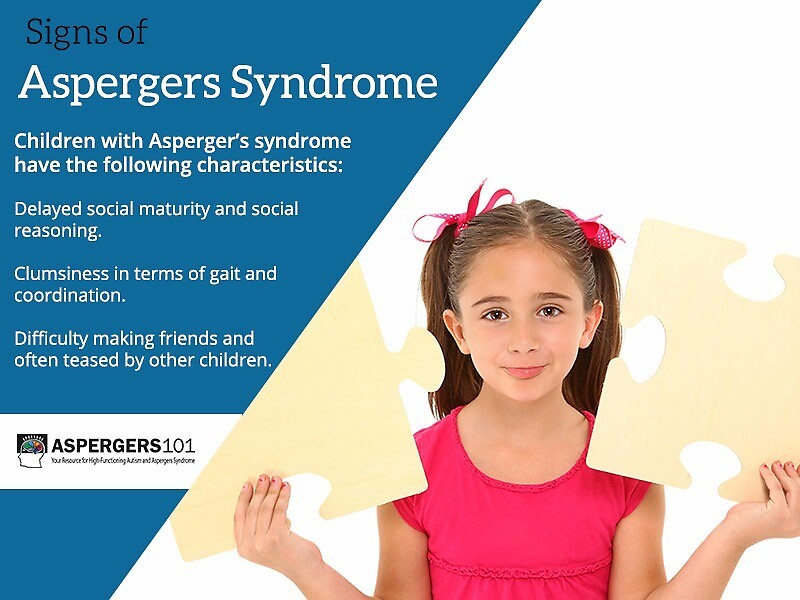 They are likely to have good grammar skills and an advanced vocabulary, but they also tend to be very literal. They have trouble using language in a social context.
They are likely to have good grammar skills and an advanced vocabulary, but they also tend to be very literal. They have trouble using language in a social context.
There may be no obvious delay in their cognitive development. Children with Asperger’s Syndrome can have problems with attention span and organization, but they usually have average intelligence.
What Causes Asperger’s Syndrome?
The causes of Asperger’s Syndrome are unknown. Genetics and brain abnormalities may be involved.
We do know that Asperger’s Syndrome is NOT the result of a child’s upbringing or poor parenting. Asperger’s Syndrome is a neurobiological disorder, meaning it is just a part of the child’s brain development, whose causes are not fully understood.
How is Asperger’s Syndrome Diagnosed?
As mentioned above, Asperger’s Syndrome is no longer diagnosed as a condition in and of itself. It is part of the range of conditions included in Autism Spectrum Disorder.
If a parent is concerned about a child’s social development, unusual language patterns, and odd behaviors, a pediatrician should be consulted. The pediatrician can determine if the child should be seen by a specialist, such as a developmental pediatrician, psychologist, or other clinician who is familiar with ASD.
The pediatrician can determine if the child should be seen by a specialist, such as a developmental pediatrician, psychologist, or other clinician who is familiar with ASD.
Testing and assessment usually involve a team of medical and psychological professionals. The specialists will ask the parent many questions about the child’s development and current skills and problems. They will also interact with the child and conduct assessments to evaluate what symptoms the child shows when interacting with others. They may also assess the child’s language and intellectual abilities. A medical doctor might ask questions or order tests to make sure there are no other medical concerns for the child.
Asperger’s Syndrome (also known as “Autism Spectrum Disorder - without intellectual or language impairment”) may be difficult to diagnose. Sometimes this condition can be confused with other conditions such as Attention Deficit Hyperactivity Disorder (ADHD), Obsessive Compulsive Disorder (OCD) or Oppositional Defiant Disorder (ODD).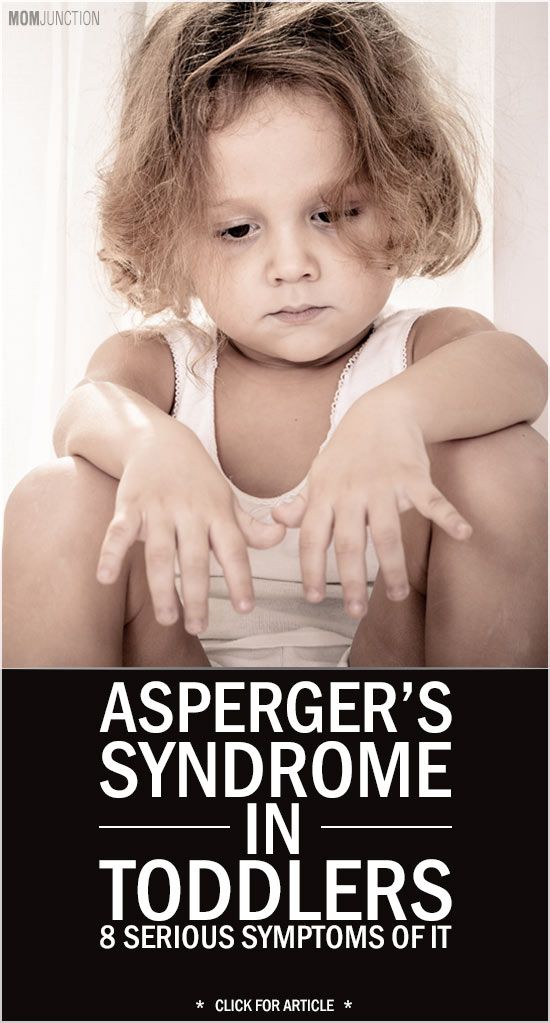 Making sure to evaluate the child’s social and communication skills, their patterns of behavior and thinking, and how these symptoms have developed over time will help the assessor provide the correct diagnosis.
Making sure to evaluate the child’s social and communication skills, their patterns of behavior and thinking, and how these symptoms have developed over time will help the assessor provide the correct diagnosis.
How is Asperger’s Syndrome Treated?
Because each case is different, treatment plans must be built according to each child’s needs. They should be adjusted over time as those needs change.
Treatment of Asperger’s Syndrome usually includes:
- Social skills training
- Behavior supports
- Cognitive behavioral therapy
- Parent education and training
- Speech-language therapy
- Occupational therapy
- Special education classes
- Medication
At present, there is no “cure.” By learning to cope with the symptoms and pick up on social cues, a child can learn to overcome some of the challenges he faces. With help, parents can learn how to best support their child. People with Asperger’s Syndrome can do well in school and go on to be contributing members of their community.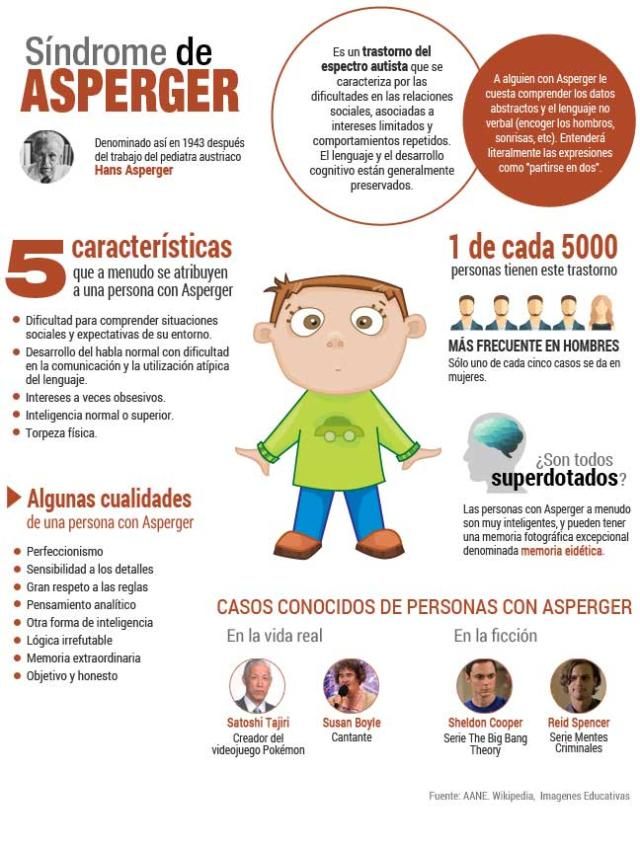
When Should I Seek Help?
Treatment should be done while a child's brain is still developing. If you notice signs of Asperger’s Syndrome or any of the symptoms of Autism Spectrum Disorder in your child, see your pediatrician. She or he can refer you to a mental health expert who specializes in diagnosing this type of disorder.
Related Conditions
- Autism Spectrum Disorder
Show More
You Might Also Be Interested In
Blog
Common Co-diagnoses Occurring with Autism Spectrum Disorder
People who have autism spectrum disorders (ASD) may also have additional health diagnoses (co-occurring conditions).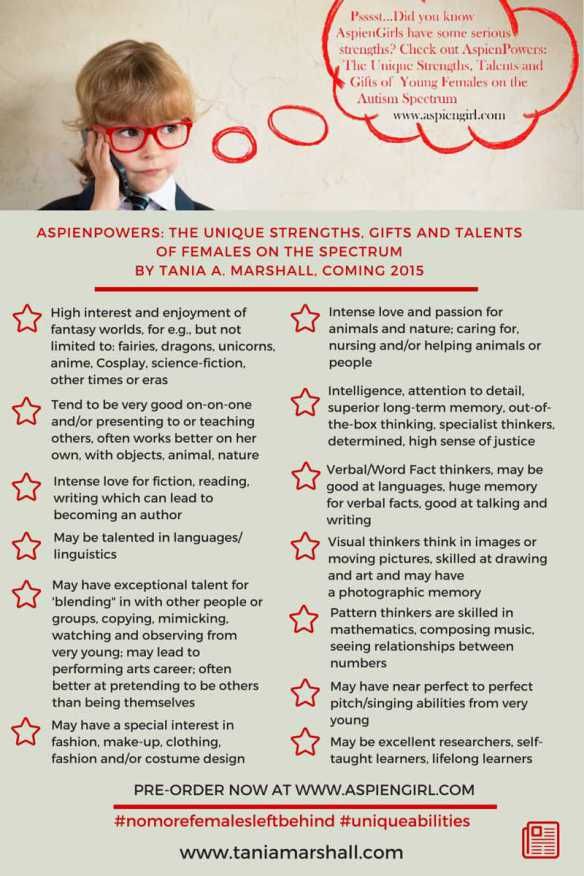 Learn more about these common conditions.
Learn more about these common conditions.
Blog
Autism Awareness Day: A Time for Acceptance and Action
April 2 marks the 11th annual World Autism Awareness Day – a day to recognize people living with autism.
Blog
Is Melatonin Safe for Kids?
For some children who need help falling asleep, melatonin has become a commonly recommended supplement. Melatonin is safe, effective and widely available.
What Is Asperger Syndrome? - Symptoms
Related Topics
What is Asperger’s syndrome?
Asperger’s syndrome (also known as just Asperger’s) is a developmental disorder. It is one form of the autism spectrum disorder diagnosis (ASD). It causes impaired language and communication skills as well as repetitive or restrictive thinking and behavior.
It is one form of the autism spectrum disorder diagnosis (ASD). It causes impaired language and communication skills as well as repetitive or restrictive thinking and behavior.
People diagnosed with Asperger’s syndrome typically have high intelligence and no speech delays. However, they tend to play, learn, speak, and act differently from others.
Symptoms of Asperger’s syndrome
Children may appear to show signs of Asperger’s syndrome at an early age. Signs your child may have Asperger’s syndrome include:
- Obsessing over a single interest.
- Craving repetition and routine (and not responding well to change).
- Missing social cues in play and conversation.
- Not making eye contact with peers and adults.
- Not understanding abstract thinking.
Your child also may have trouble with pretend play, not want to be held or touched, or have unusual reactions to noises, smells, or tastes. These things may be noticeable to your child’s doctor, teacher, and even to you as a parent.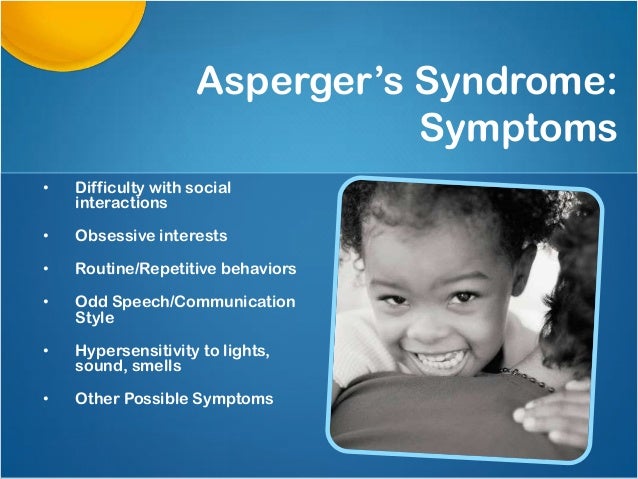 See your doctor if you suspect your child’s communication and social skills are not developing appropriately. Your doctor may refer you to a developmental specialist.
See your doctor if you suspect your child’s communication and social skills are not developing appropriately. Your doctor may refer you to a developmental specialist.
What causes Asperger’s syndrome?
No one thing causes Asperger’s syndrome. However, research suggests that certain factors during pregnancy and after birth may put a child at higher risk of an autism spectrum disorder diagnosis. Those factors include:
- A chromosomal abnormality (such as fragile X syndrome).
- A mother’s use of prescription medicines taken during pregnancy (such as valproic acid for seizures or mood disorders, or thalidomide for anxiety).
- Having been born to older parents.
This type of autism spectrum disorder appears to be diagnosed more often in boys than girls.
How is Asperger’s syndrome diagnosed?
Doctors are able to diagnose this Asperger’s syndrome in children as young as 18 months old. There is no blood test or medical imaging scan to diagnose the condition.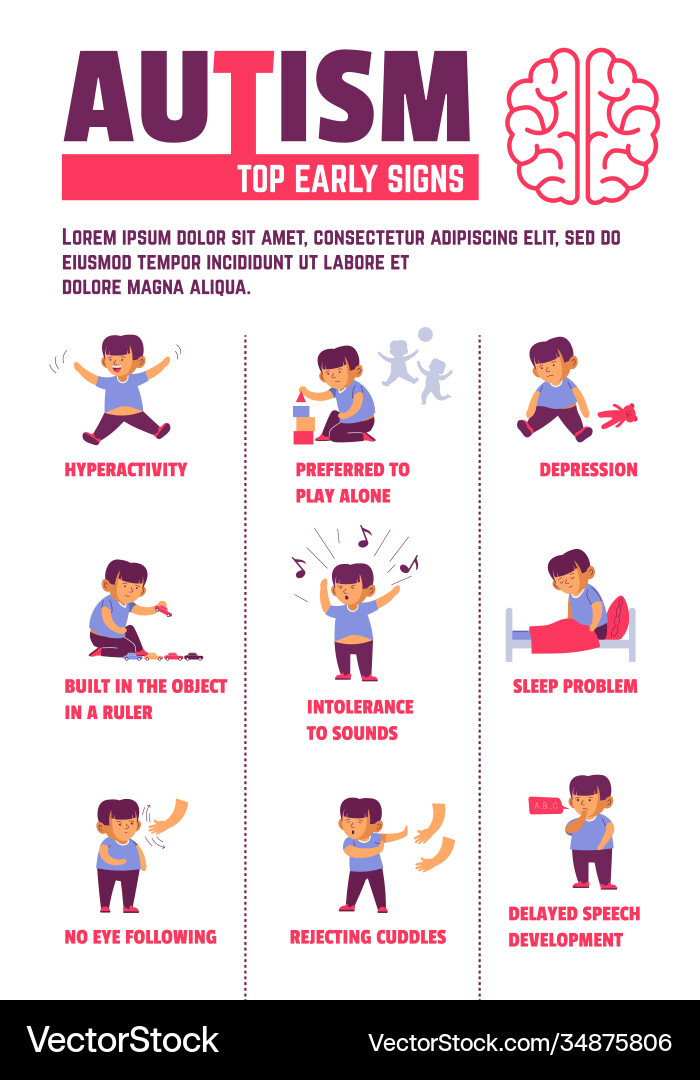 Doctors compare a child’s behavior and development to a milestone checklist against same-age peers.
Doctors compare a child’s behavior and development to a milestone checklist against same-age peers.
Can Asperger’s syndrome be prevented or avoided?
Because the cause of autism spectrum disorder is unknown, there is no way to prevent or avoid it.
Asperger’s syndrome treatment
Early and regular treatment can help your child cope with the symptoms related to Asperger’s syndrome. It can prepare him or her for adult life. Treatment usually includes a mix of speech, physical, occupational, and cognitive behavioral therapy (CBT). The therapy team will decide how often it needs to work with your child. Therapy sessions might look like this:
- Social skills and speech therapy:Your child may speak well. However, he or she may need to learn important conversation skills. Those skills include learning to take turns while talking, making eye contact with the other person, showing interest in what the person says, and learning to talk about a variety of topics, not obsessing over one topic.
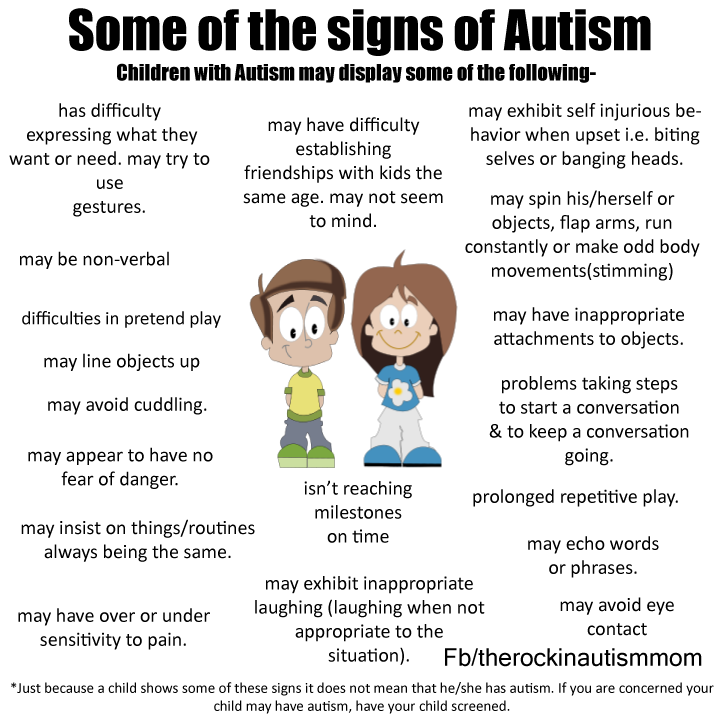 The therapist also might teach appropriate playtime skills, such as taking turns, following rules, and learning to cope with one’s emotions around others.
The therapist also might teach appropriate playtime skills, such as taking turns, following rules, and learning to cope with one’s emotions around others. - Physical therapy:Some people diagnosed with Asperger’s syndrome may appear clumsy. A physical therapist works to develop a person’s core body strength. This will help with running, jumping, pedaling a bike, walking up and down stairs, and other physical movement activities.
- Occupational therapy:An occupational therapist helps people with Asperger’s syndrome with their fine motor skills (anything requiring the use of their hands). They also work to help your child cope with sensory issues. A person diagnosed with Asperger’s syndrome may be sensitive to certain sensory experiences. This might include noise, touch, smell, or visual stimuli. It might include certain materials, such as modeling clay, chalk, sand, and water. It could include sensory issues related to eating different types of food and textures.
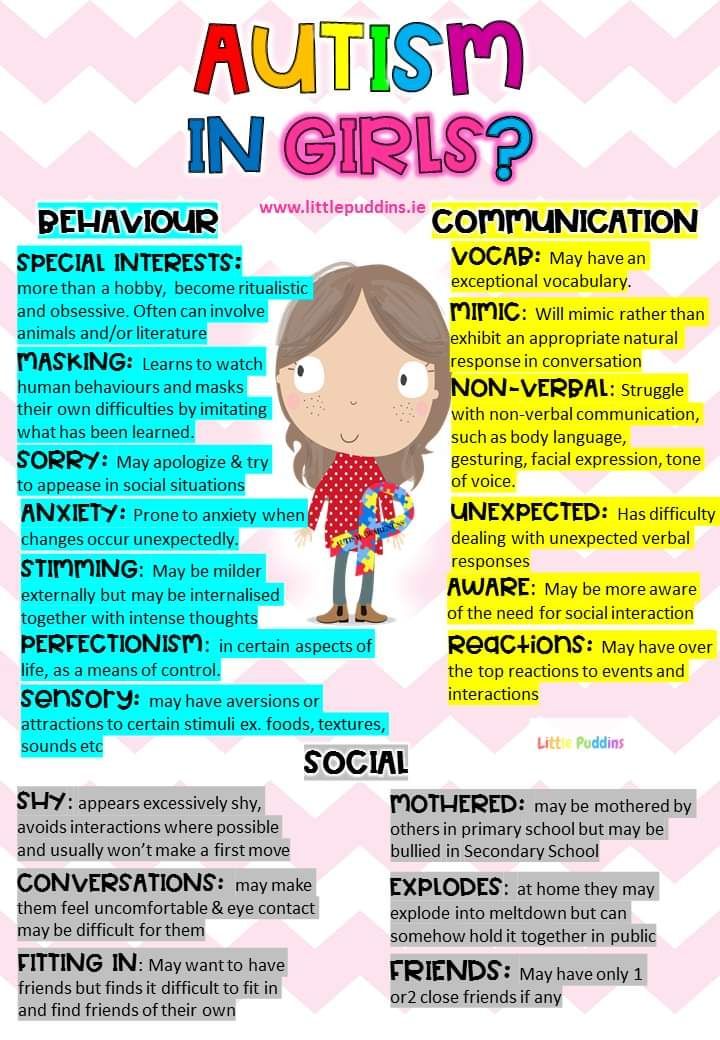 Your child’s therapist also will work on hand-eye coordination and teach your child to feed him or herself appropriately. Before your child starts school, an occupational therapist will develop your child’s pre-writing hand strength. Once your child enters school, the therapist will help him or her develop handwriting skills.
Your child’s therapist also will work on hand-eye coordination and teach your child to feed him or herself appropriately. Before your child starts school, an occupational therapist will develop your child’s pre-writing hand strength. Once your child enters school, the therapist will help him or her develop handwriting skills. - Cognitive Behavior Therapy:Cognitive Behavior Therapy (CBT) teaches people with Asperger’s syndrome how to act socially and cope with their emotions. It teaches important skills such as controlling impulses, fears, anxiety, obsessions, interrupting, and tantrums. It’s different for every person, based on his or her needs.
- Medicine:There is no medicine to treat Asperger’s syndrome. Most medicines treat the anxiety, depression, or inability to focus related to Asperger’s syndrome. Commonly prescribed medicines for anxiety and depression include selective serotonin reuptake inhibitors (SSRIs), antipsychotic medicine, and stimulant medicines.
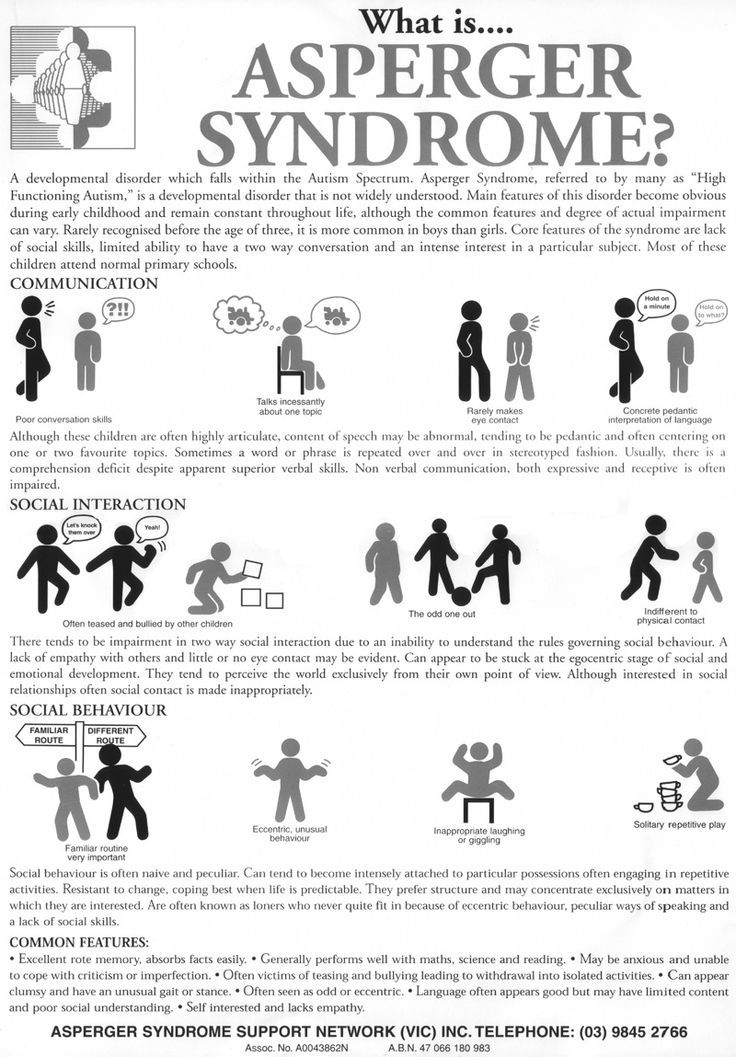
Don’t ignore your child’s early social and communication delays. Asperger’s syndrome behaviors will not improve on their own without therapy. As your child progresses through school, therapy may change to reflect your child’s needs at the time. More importantly, ask your therapists how to apply the therapy at home. Children do best when therapy is the same at school and home.
Therapy is not a one-time treatment. Repetitive therapy helps your child develop appropriate behavior. Children should not be punished for inappropriate behavior. Instead, therapists use incentives and rewards (giving your child extra free time, a healthy snack, or something that is important to them) to encourage appropriate behavior.
Living with Asperger’s syndrome
If your child was diagnosed with Asperger’s syndrome or ASD, developing relationships for him or her will take practice and effort. A person diagnosed with Asperger’s syndrome may not display appropriate emotions (or any emotion), may not understand the irony in a joke, vague concepts, or the simple points of a conversation.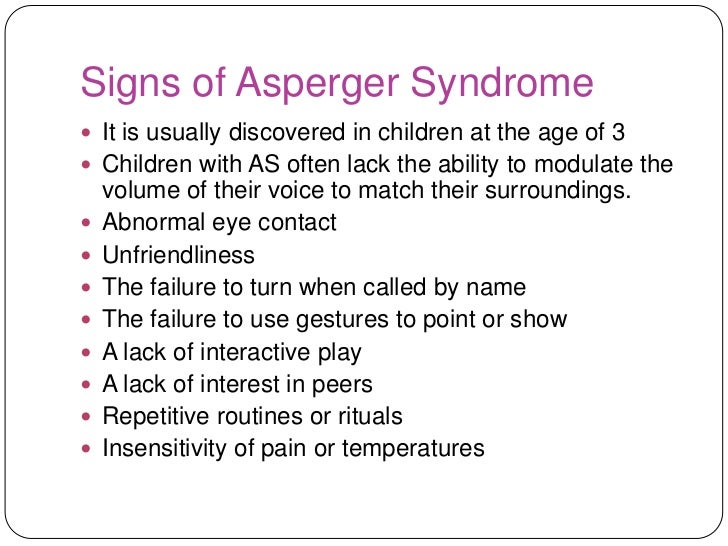 Peers may feel like their behavior is eccentric.
Peers may feel like their behavior is eccentric.
Although Asperger’s syndrome or ASD cannot be cured, therapy can help. Your child can be successful at school and in their adult life. Many employers say that the focus and attention a person with Asperger’s syndrome or ASD gives to his or her job is a good thing. Adults diagnosed with Asperger’s syndrome or ASD may continue to need therapy or counseling to teach appropriate personal and workplace behavior.
Questions to ask your doctor
- Should I tell my child he or she has Asperger’s syndrome/ASD when he or she is older?
- Is Asperger’s syndrome/ASD associated with violent or self-injurious behavior?
- How can I cope with the stress of raising a child with Asperger’s syndrome/ASD?
Asperger's Syndrome | Autism FRC
Asperger's syndrome-, like Kanner's syndrome, belongs to non-procedural, dysontogenetic forms of RDA. Recently, it has been referred to as a constitutional pathology of the autistic type.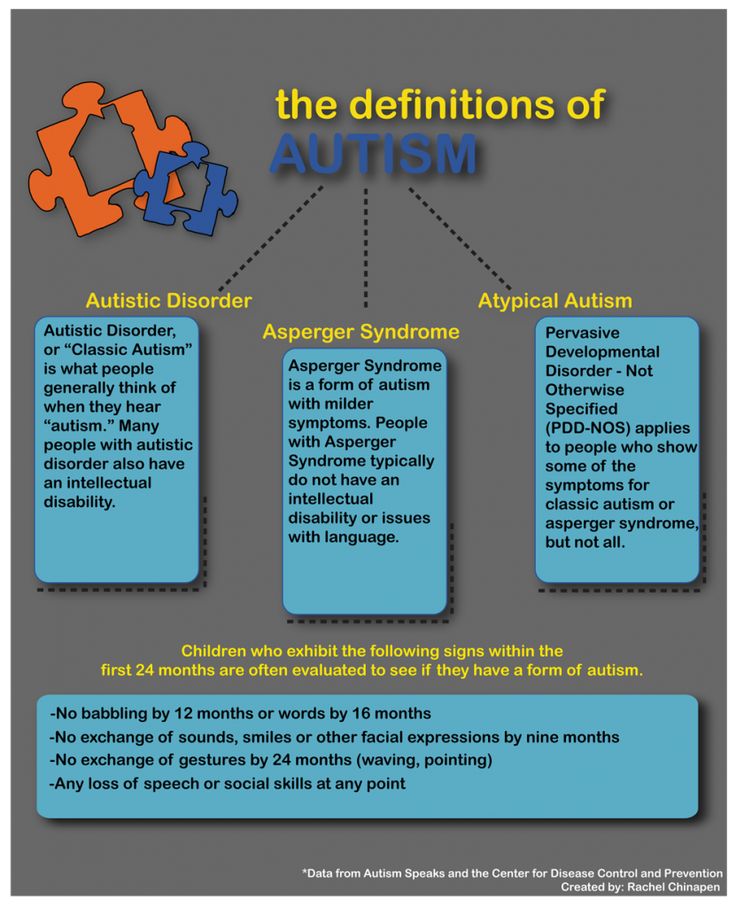
1) As with other types of autism, the condition in Asperger's syndrome is determined by communication disorders, underestimation of reality, a limited and peculiar, stereotypical circle of interests, which distinguishes such children from their peers. nine0005
2) Violation of social interaction can manifest itself in the following forms:
- extreme egocentrism - the inability to interact with peers;
- peer interaction is possible but not attractive, meaningful or highly valued;
- social and emotional inadequacy of communication.
3) The child gives the impression of being old-fashioned, a “little old man”, perceived by other children as an eccentric professor. Lives in his own world with narrow, unusual interests. Demonstrates unusual tendencies (collecting). Collects facts related to certain events, but does not always understand the meaning (reads encyclopedias about dinosaurs - remembers everything (they often have a good mechanical memory), but they may not understand what an era is).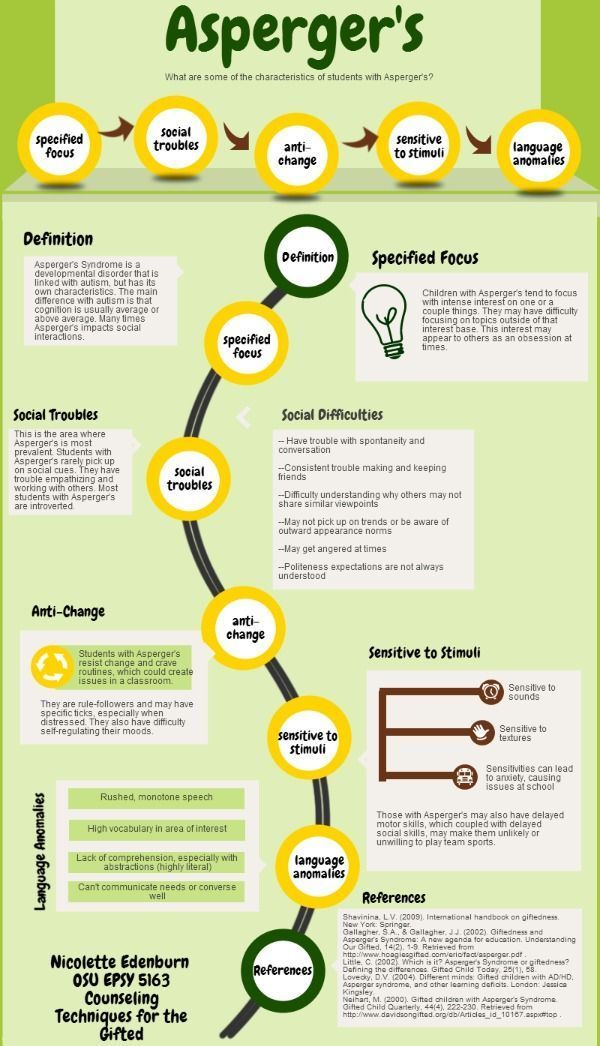 nine0005
nine0005
4) Some children show an early ability for an unusual, non-standard understanding of themselves and others. Logical thinking is preserved or even well developed, but knowledge is difficult to reproduce and extremely uneven.
5) A child can be surprisingly successful at one thing and unsuccessful at another. For example, he is fluent in the language, but finds it difficult to adapt to the social context and various hearings (it is difficult for him to conduct a dialogue). There are difficulties in understanding the figurative meaning of metaphors (which is not related to the level of intelligence). nine0005
6). Active and passive attention are unstable, but individual autistic goals are achieved with great energy.
7) There is a deviant, unusual style of communication:
- the communicative function of speech is weakened. Speech - formal, pedantic, boring, poor intonation, unusually modulated, peculiar in melody, rhythm and tempo (robot-like, slightly modulated language, the child speaks as if in different voices), the voice sounds either quiet or cuts the ear and in general speech is often similar to recitation.
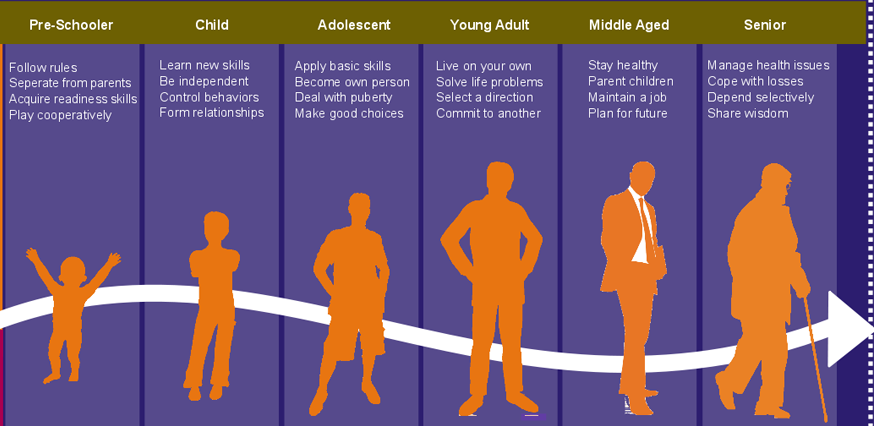 There is a tendency to word creation, which sometimes persists after puberty. The child often involuntarily makes various sounds “clears his throat”, laughs; nine0012
There is a tendency to word creation, which sometimes persists after puberty. The child often involuntarily makes various sounds “clears his throat”, laughs; nine0012 - problems of non-verbal communication are revealed: inability to use gestures, clumsiness, limited mimic expression,
- an unusual style of eye contact (very gazing or gaze avoidance) is noted.
8) Children with Asperger's syndrome have reduced empathy (reduced ability to understand the feelings of other people and adapt to them). Attachment to the house, and not to relatives, is characteristic.
9) They have no close friends. They are often offended. At the same time, the child wants to communicate, to be socialized, but it is extremely difficult for him to do this. He can be with other children, but only if these children adjust to him. There is an attraction to autistic games. Team games are difficult because the autistic child is only interested in his own score, not the score of the team.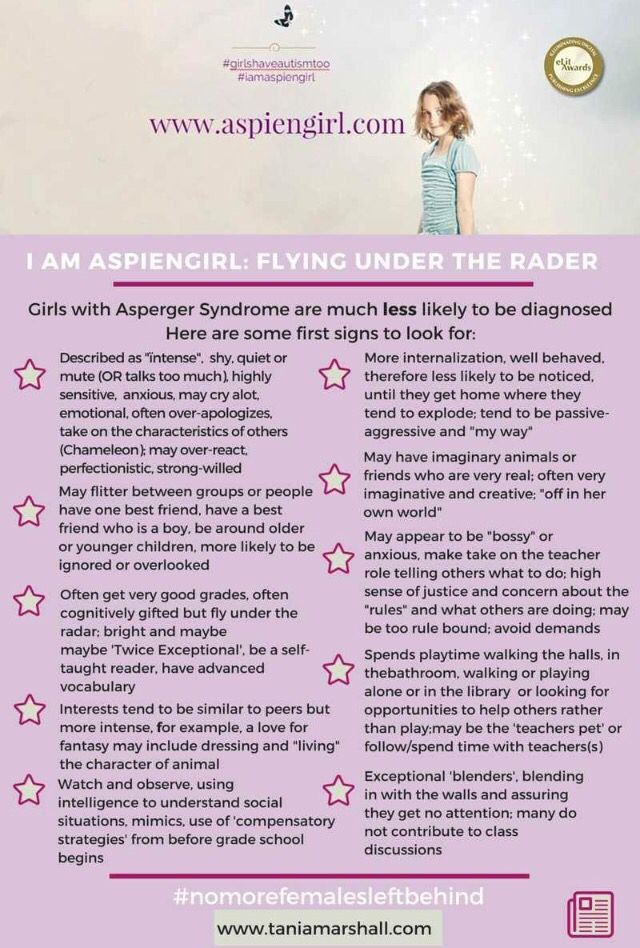 nine0005
nine0005
10) In appearance, the detached expression of the face attracts attention, which gives it “prettyness”, the facial expressions are frozen, the gaze is turned into emptiness, the fixation on the faces is fleeting. There are few expressive facial movements (minimal expression), gesticulation is depleted. Sometimes the facial expression is concentrated and self-deep, the gaze is directed “inward”.
11) Behavior is determined by impulsiveness, contrasting affects, desires, ideas (often behavior lacks internal logic). nine0005
12) Motor sphere is poorly developed:
- there is clumsiness, awkwardness;
- motility is angular, movements are irregular with a tendency to stereotypes.
13) Intelligence Unlike other cases of autism, there is no significant delay in speech and cognitive development in Asperger's syndrome. Intelligence is often normal (overall IQ of at least 70, while verbal intelligence is better developed, and non-verbal intelligence is worse) or above normal.
nine0005
Written N.V.
The following literature was used: Bashina V.M. Autism in childhood. - Moscow. - "Medicine". - 1999; Kovalev V.V. Psychiatry of childhood. - Moscow. - "Medicine". - 1995; Nikolskaya O.S., Baenskaya E.R., Liebling M.M. Autistic child. Help paths. - Moscow. - “Terevinf”. – 1997
Asperger's syndrome: how to help a child
home
reference Information
Resources for Parents
Asperger's syndrome: how to help your child
Asperger's Syndrome is a developmental disorder in which a child has problems with social communication and non-verbal communication. This disease differs from other manifestations of the autism spectrum in that there is a distortion of normal speech and problems with the development of intelligence.
The disorder is named after Australian pediatrician Hans Asperger. At 19In 44, he published a paper in which he described four children - they lacked the ability to non-verbal communication and there was a poor understanding of the feelings of strangers.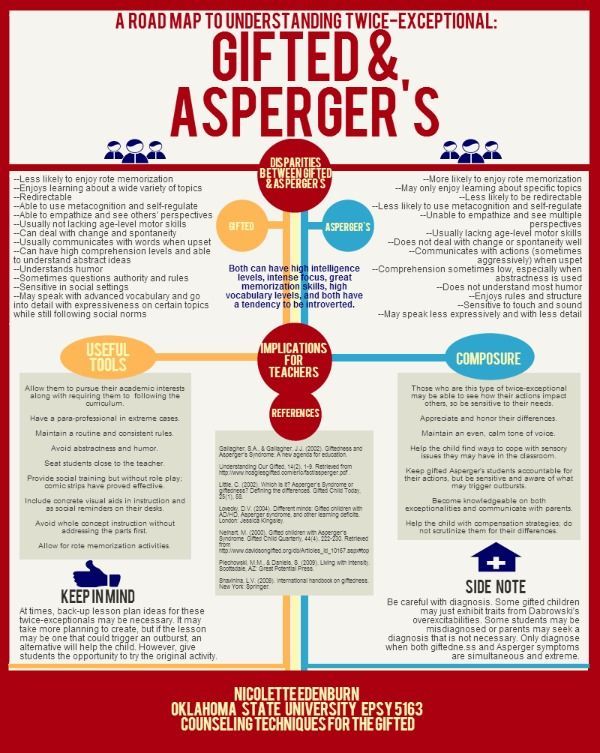 They did not understand how to show empathy for their peers. Because of these characteristics, it was difficult for children to integrate into society. Asperger gave this condition a name - "autistic psychopathy".
They did not understand how to show empathy for their peers. Because of these characteristics, it was difficult for children to integrate into society. Asperger gave this condition a name - "autistic psychopathy".
Symptoms
It is difficult for children with Asperger's syndrome to express themselves emotionally, they do not perceive gestures, facial expressions, voice intonations, it is difficult for them to choose a topic for conversation, to understand when a conversation can be started or ended, it is difficult for them to understand humor, sarcasm, allegories. Difficulties in communication affect social interactions. So, children with this pathology experience difficulties in communicating with other children, in maintaining relationships. In games, it is difficult for such children to accept a role, to show imagination. They prefer logical and mechanical games more. From the outside, these children seem clumsy, they can talk out of place, start inappropriate topics of conversation, get too close to strangers.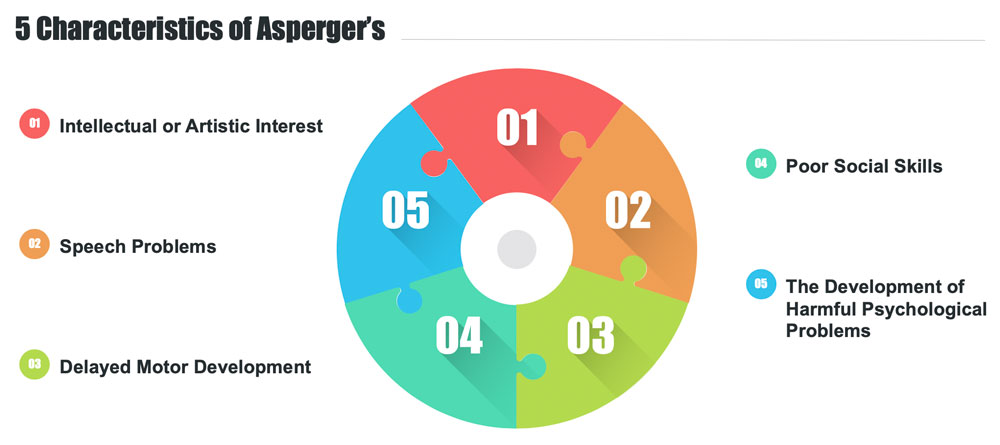 Children with Asperger's Syndrome sometimes develop semantic dyslexia - reading without understanding the meaning of what is read. nine0005
Children with Asperger's Syndrome sometimes develop semantic dyslexia - reading without understanding the meaning of what is read. nine0005
Problems in social communication with peers - lack of non-verbal social behavior, which is required for social communication with each other. It starts with poorly developed verbal and gestural communication. It can develop to the complete absence of adequate facial expressions.
Stereotypical body movements, thoughtless use of objects or verbal constructions (for example, constant movements in the same ways, following patterns of behavior and movement, meaningless repetition of new words and phrases). nine0005
The lack of full communication with people in children in the future can lead to the development of clinical depression or anxiety neurosis. Therefore, parents should turn to specialists as soon as possible and begin psychological and pedagogical correction of a child with Asperger's syndrome, aimed at social adaptation.
Doctors of related specialties are involved in the diagnosis of Asperger's syndrome: a child psychiatrist, a psychologist, a child neurologist, a teacher-defectologist.